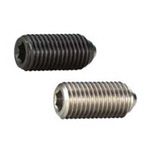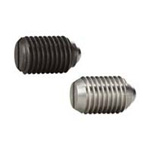(!)NOTE : Windows 7 users won’t be able to use some latest features of eCatalog/WOS since Microsoft is ending support for Windows 7 on 14 Jan, 2020. Please upgrade your system for uninterrupted services.
- Notice of End of Sales for Economy Series Pneumatic Equipment Category. More information.
NABEYA Ball Plungers(Body Material:Steel)
|
Mounting Method
|
|
|---|---|
Brand |
|
| CAD |
|
| Days to Ship |
|
2 items
- Sort By
-
You can add up to 6 items per a category to the compare list.

NABEYA
[Features]
· Heat resistance of up to 250°C.
· Optimal plunger for positioning, fixing, pressing, and press releasing.- CAD :
- 2D
Mounting Method Outer Dia. M(mm) Stroke S(mm) Tip Material Body Material Lock Initial Load (Range)(N) Tip Heat Treatment Main Body Surface Treatment Tip Surface Treatment Screw (Hex) 6 ~ 12 1 ~ 2.5 Steel Steel Not Provided 0.01~50 / 50.01~100 Carburized Black Oxide Not Provided From: ₹ 632.00 Days to Ship: Same day or more  Same day or more
Same day or more
-
You can add up to 6 items per a category to the compare list.

NABEYA
This plunger is ideal for positioning, fixing, pressing, pushing against and pushing apart.
- CAD :
- 2D
Mounting Method Outer Dia. M(mm) Stroke S(mm) Tip Material Body Material Lock Initial Load (Range)(N) Tip Heat Treatment Main Body Surface Treatment Tip Surface Treatment Screw (Straight Slot) 3 ~ 12 0.4 ~ 2.5 Steel Steel Not Provided 0.01~50 / 50.01~100 Carburized Black Oxide Not Provided From: ₹ 220.04 Days to Ship: 5 Day(s) or more  5 Day(s) or more
5 Day(s) or more
| Brand |
|---|
| Product Series |
| CAD |
| From |
| Days to Ship |
| Mounting Method |
| Outer Dia. M(mm) |
| Stroke S(mm) |
| Tip Material |
| Body Material |
| Lock |
| Initial Load (Range)(N) |
| Tip Heat Treatment |
| Main Body Surface Treatment |
| Tip Surface Treatment |
You can add up to 6 items per a category to the compare list. | You can add up to 6 items per a category to the compare list. | |
| Brand | NABEYA | NABEYA |
| Product Series | ||
| CAD |
|
|
| From | ₹ 632.00- | ₹ 220.04- |
| Days to Ship | Same day or more | 5 Day(s) or more |
| Mounting Method | Screw (Hex) | Screw (Straight Slot) |
| Outer Dia. M(mm) | 6 ~ 12 | 3 ~ 12 |
| Stroke S(mm) | 1 ~ 2.5 | 0.4 ~ 2.5 |
| Tip Material | Steel | Steel |
| Body Material | Steel | Steel |
| Lock | Not Provided | Not Provided |
| Initial Load (Range)(N) | 0.01~50 / 50.01~100 | 0.01~50 / 50.01~100 |
| Tip Heat Treatment | Carburized | Carburized |
| Main Body Surface Treatment | Black Oxide | Black Oxide |
| Tip Surface Treatment | Not Provided | Not Provided |
Loading...
Configure
Specification/Dimensions
-
Outer Dia. M(mm)
-
Stroke S(mm)
-
Tip Material
- Steel
- Stainless Steel
- Plastic
- Others / Ceramics
-
Body Material
- Steel
- Stainless Steel
- Brass
- Plastic
- Others
-
Lock
- Not Provided
- Provided
-
Initial Load (Range)(N)
-
Tip Heat Treatment
-
Main Body Surface Treatment
-
Tip Surface Treatment
Narrow search by specifying Manufacturer
Related Categories to Ball Plungers
FAQ Ball Plungers
- Question: What is a ball plunger?
- Answer: A ball plunger is a mechanical device that uses a spring-loaded ball to provide positive contact between two mating surfaces. It is typically used to position, align, and lock components in a wide range of industrial applications. Ball plungers are available in a variety of sizes and configurations, making them suitable for a wide range of applications.
- Question: Why choose MISUMI ball plungers?
- Answer: MISUMI ball plungers are a popular choice for a variety of industrial applications due to their high quality, durability, and reliability. These products are made by leading Asian manufacturers, and we carefully select them as per our customers' requirements. They are also available in a wide range of sizes and configurations to meet the needs of a variety of applications.
- Question: What are ball plungers used for?
- Answer: Ball plungers are tiny tools used in different areas to help with precise positioning or locking. They have a spring-loaded ball inside a housing. When the ball is pressed, it extends, and when released, it retracts. They are commonly found in industries like manufacturing and electronics. They are useful for tasks such as aligning parts, holding them in place, or creating a detent mechanism for secure positioning.
- Question: What material is used in ball plunger?
- Answer: Ball plungers are usually made from different materials depending on their specific use. The most common materials are stainless steel, hardened steel, brass, and plastic. Stainless steel is resistant to rust and very strong. Hardened steel is tough and can withstand wear and tear. Brass is used when electrical conductivity is important. Plastic ball plungers are lightweight and used for less demanding tasks. The material choice depends on factors like strength, durability, and the purpose of the ball plunger.
- Question: What is the standard size of a ball plunger?
- Answer: The standard size of a ball plunger can vary depending on the manufacturer and application. However, they generally come in different diameters and lengths. Common diameters range from 3mm to 20mm, while lengths can range from 10mm to 50mm or more. These sizes are widely used, but it's important to note that specific industries or applications may have their own standard sizes based on their requirements.
- Question: How much pressure does a plunger create?
- Answer: The amount of pressure a plunger creates depends on various factors, including its design, size, and the force applied to it. Plungers typically generate pressure by compressing air or liquid trapped within a confined space. The specific pressure created can vary significantly. In household use, a plunger can create enough pressure to unclog a drain. However, in industrial applications, specialized plungers can generate much higher pressures to perform tasks such as hydraulic or pneumatic actuation.
- Question: How does a ball plunger work?
- Answer: A ball plunger consists of a threaded body, a spring, and a ball. The ball is held in place by the spring, which pushes it against the mating surface. When pressure is applied to the ball plunger, the spring compresses and the ball is retracted. This allows the two mating surfaces to move relative to each other. Once the pressure is released, the spring expands, and the ball is pushed back into contact with the mating surface.
- Question: What are the different types of ball plungers?
- Answer:
There are many different types of ball plungers available, each with its own unique features and benefits. Some of the most common types of ball plungers include:
Spring-loaded ball plungers: These are the most common type of ball plunger. They are available in a wide range of sizes and configurations and can be used for a variety of applications.
Heavy-duty ball plungers: These ball plungers are designed to withstand heavy loads and demanding environments. They are typically made from durable materials such as stainless steel or hardened steel.
Precision ball plungers: These ball plungers are designed to provide precise positioning and alignment. They are typically made from high-quality materials and are manufactured to tight tolerances. - Question: What are the benefits of using ball plungers?
- Answer:
Ball plungers offer a number of benefits, including:
Precise positioning and alignment: Ball plungers can be used to achieve precise positioning and alignment of components. This is due to the fact that they provide positive contact between the two mating surfaces.
Secure locking: Ball plungers can also be used to securely lock components in place. This is due to the fact that the spring-loaded ball provides a constant force against the mating surface.
Easy installation and use: Ball plungers are easy to install and use. They are typically threaded into a hole in the workpiece and can be tightened or loosened with a wrench.
Durability: Ball plungers are made from durable materials and can withstand demanding environments. This makes them ideal for use in a wide range of industrial applications. - Question: What are some common applications for ball plungers?
- Answer:
Ball plungers are used in a wide range of industrial applications, including:
Machine tools: Ball plungers are used in machine tools to position and align workpieces.
Molding and casting: Ball plungers are used in molding and casting operations to position and align mold cores and cavities.
Assembly: Ball plungers are used in assembly operations to position and align components during assembly.
Robotics: Ball plungers are used in robotics to position and align grippers and other end-of-arm tools.
Medical devices: Ball plungers are used in medical devices to position and align components such as needles and surgical instruments. - Question: How to install and use a ball plunger?
- Answer:
To install and use a ball plunger, follow these steps:
Thread the ball plunger into a hole in the workpiece.
Tighten the ball plunger until it is snug.
Apply pressure to the ball plunger to position or lock the component in place.
Once the component is in place, release the pressure on the ball plunger. - Question: What to do if ball plunger is not working propery?
- Answer:
If a ball plunger is not working properly, there are a few things you can check:
1. Make sure that the ball plunger is properly installed.
2. Make sure that the ball plunger is not damaged.
3. Make sure that the ball plunger is the correct size for the application.
4. Make sure that the ball plunger is made of the correct material for the environment in which it is being used.












How can we improve?
How can we improve?
Thank you for your time.
Your feedback is essential for our continuous improvement
Privacy Policy
Thank you for your cooperation.
Thank you for your time.
Your feedback is essential for our continuous improvement
Please use the inquiry form.
Privacy Policy